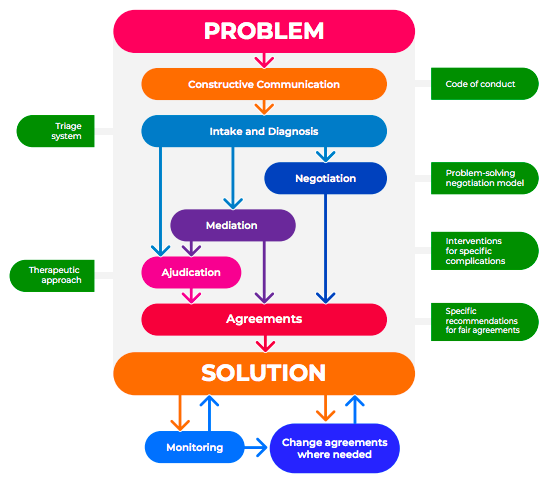Mediation techniques

The mediator should be outcome-focused
He or she steers the process; through posing solution-focused questions, he or she encourages the clients to look ahead to their desired future situation and how they can achieve this outcome. It revolves around the outcome that the clients want to achieve. Solution-focused mediators will ask “What would you prefer instead of the conflict?”, defined in positive, realistic and concrete terms.
What practitioners say
Be aware of different mediation providers. Many formal and informal justice providers, such as police and cultural leaders offer mediation services. Some of them are not trained mediators. There are specialized and trained mediators available, to whom can be referred to.
Be aware of different mediation types. The main types of mediation are transformative, facilitative, and evaluative.
- Evaluative mediation is the style of mediation where the mediator exerts the most control throughout the mediation, and is the most vocal about the positions and offers of the parties.
- In facilitative mediation, the mediator will control the procedure of the mediation, but the parties control the outcome.
- Transformative mediation seeks to transform the conflict by empowering the parties to agree. The transformative mediator is only in the room to call attention to the needs, interests, values and points of view of the parties.
Be aware of the costs of mediation. When parties decide to mediate, the parties need to pay. In government-initiated mediation, the parties do not directly have to pay. Parties do not have to pay the police for reporting and offered mediation.
Conduct gender and power analyses. The dynamics in families will need to be identified. Power imbalance refers to decision-making and access to resources within a family. Who provides income? Who takes care of the children? Be careful, bringing up the topic of power balance can escalate the conflict. Moderate the words, use a different term than balance (for example: position of the parties, or personal standing of the parties). Economic status does not always defines power. Rather discuss negotiation ability.
Resources and Methodology
Recommendation 1
This page focuses on specific meditation techniques that can be applied by mediators, regardless the mediation style. James Wall identified 100 mediation techniques (Druckmann and Wall, p. 1915). We compare two techniques, leaving much room for further research on other mediation techniques.
One technique that can be applied by mediators is formulating questions that seek to get clients to make suggestions about solutions. These questions are referred to as solution-focused questions, which originates from solution-focused brief therapy (Stokoe and Sikveland). The mediator is outcome-focused. The mediator tends to steer the process; through posing solution focused questions, he or she encourages the clients to look ahead to their desired future situation and how they can achieve this outcome. It revolves around the outcome that the clients want to achieve (Bannink, p. 176). Solution-focused mediators will ask “What would you prefer instead of the conflict?”, defined in positive, realistic and concrete terms (Bannink, p. 177).
Another technique for mediators is to formulate problem-focused questions. Problem-focused questions are focused on the history of the conflict (Bannink, p. 175-176). According to the problem-focused model the mediator first needs to explore and analyze the problem. Clients describe the problem and then negotiate an agreement that satisfies the needs of all involved. Mediators facilitate negotiation and are focussed on the process rather than on outcomes.
For mediators, is asking solution-focused questions more effective than problem-focused questions for the well-being of people in neighbour conflicts?
The databases used are: HeinOnline, Westlaw, Wiley Online Library, JSTOR, Taylor & Francis, ResearchGate, SSRN.
For this PICO question, keywords used in the search strategy are: questions, questioning, mediation, solution-focused, problem-focused, techniques, brief therapy, outcome, process.
The main sources of evidence used for this particular subject are:
- Daniel Druckman and James A. Wall, A Treasure Trove of Insights: Sixty Years of JCR Research on Negotiation and Mediation (2019)
- Frederike P. Bannink, Solution-Focused Mediation: The Future with a Difference (2007)
- Elizabeth Stokoe and Rein O. Sikveland, Formulating solutions in mediation (2016)
- Katina Foster, A Study in Mediation Styles: A Comparative Analysis of Evaluative and Transformative Styles (2003)
- Steve de Shazer and Yvonne Dolan, More Than Miracles: The State of the Art of Solution-Focused Brief Therapy (2012)
- Anthony M. Grant, Making a positive change: a randomized study comparing solution-focused vs. problem-focused coaching questions (2012)
The article by Druckman and Wall provides an overview research on negotiation and mediation, conducted in the last six decades.
Bannink compares solution-focused mediation (based on solution-focused questioning) to other types of mediation. The article is based on expert-opinions. The research team establishes a minor risk of bias of the author, as the evidence seems to be used to support one favoured intervention. More empirical research or randomized controlled trials on this topic are needed in order to generate more evidence.
The article by Stokoe and Sikveland examines the work done by formulations in the service of pursuing solutions to disputes between neighbours in a community mediation setting, drawing on a collection of 30 recorded mediation sessions between mediators and their clients. Mediators ask solution-focused questions, which are treated in mediation training as a key method for effecting client-generated solutions to neighbour disputes.
The article by Grant is a randomized study comparing solution-focused and problem-focused questions in the field of coaching. Similar studies are needed in the field of neighbour disputes in order to generate stronger evidence.
According to the research method, we grade the evidence as low. Sources consist of expert opinions, empirical research and randomized controlled trials. Although the strength of evidence is low, current research looks promising and a clear direction for further research has been identified.
| Problem-focused questions | Solution-focused questions |
| Solution-focused conversations have a positive effect in less time and satisfy the client’s need for autonomy more than problem-focused conversations.
The solution-focused model has proved to be applicable in all situations where there is the possibility of a conversation between client and professional (Bannink, p. 174). Applying solution-focused questions results in increased self-efficacy and other positive effects. [According to a randomized study comparing solution-focused and problem-focused questions in the field of coaching], the solution-focused approach significantly increased positive affect, decreased negative affect and increased self-efficacy. Solution-focused questions generated significantly more action steps to help people to reach their goals (Grant, p. 88). The solution-focused approach ensures a continuous evaluation of the mediation process. By asking scaling questions throughout the mediation process and by asking at the beginning of each conversation “What is better?”, evaluation of mediation is taking place continuously (Bannink, p. 180). [This could enhance the quality of mediation and perhaps quality of solutions]. |
Undesirable outcomes
| Problem-focused questions | Solution-focused questions |
| Problem-focused questions can slow down the process of finding a solution.
If the problem or conflict and its possible causes are studied, a vicious circle may be created with ever-increasing problems. This atmosphere becomes loaded with problems, bringing with it the danger of losing sight of the solution (Bannink, p. 175). Applying problem-focused questions can result in a negative atmosphere. Conversations about the clients’ positions and a familiarization with the history of the conflict are both deemed not only unnecessary but even undesired, due to their negative influence on the atmosphere during the conversation and the unnecessary prolongation of the mediation (Bannink, p. 176). |
Applying solution-focused questions may result in solutions that are not owned by the parties in conflict.
Clients want mediators to provide solutions and not leave it for them to ‘sort out differences’. The challenge here can be found in formulations and solution-focused, (or rather solution-proposing) questions. Solutions are the work of mediation, but they are not necessarily the work of clients (Stokoe and Sikveland). [In order for mediators to avoid proposing solutions to their clients, they should be careful in phrasing solution-focused questions]. |
Balance of outcomes
| Asking solution-focused questions by a mediator positively affects people’s wellbeing. Mediators should be careful in formulating these questions.
Problem-focused questions on the other hand are not associated with increasement of well-being. In fact, research suggests that applying problem-focused questions may result in a slower resolution process and a negative atmosphere between parties. The desirable outcomes of solution-focused questions outweigh those of problem-solving questions. Therefore, applying solution-focused questions is preferred. |
Recommendation
| Taking into account the balance of outcomes, the effect on neighbours’ well-being, and the quality and consistency of the evidence, we make the following recommendation: For neighbours in conflict, asking solution-focused questions by the mediator is more effective than asking problem-focused questions, for their well-being. |


